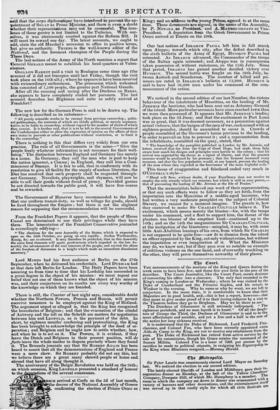We noticed in the second edition of our last Number,
the riotous behaviour of the inhabitants of Mauritius, on the landing of Mr. JEREMIE the barrister, who had been sent out as Attorney-General of the island. More particular accounts have since reached town than we were then possessed of. It appears that Mr. JEREMIE'S landing took place on the 3d June; and that the excitement in Port Louis was so great, that it was deemed necessary, as a precaution against actual violence, that the barges of the men of war, each armed with an eighteen-pounder, should be assembled to cover it. Crowds of people assembled at the Governor's house previous to the landing, in order toprevail on him to prevent it ; and a representation from the inhabitants, assembled on the quay, stated, that
" The knowledge of the pamphlet published in London by Mr. Jeremie, and letters received that day from the Cape of Good Hope, had made them fully aware how much his designs and principles were hostile to the colony ; that his arrival was expected by the slaves as a signal of liberty, and that the greatest excesses would be produced by his presence ; that the ferment increased every moment, and that the free population would, at any hazard, prevent the landing of the man whom they regarded as the forerunner of the most frightful evils."
This tissue of exaggeration and falsehood ended very much in O'CONNELL'S style— "Blood will flow, without doubt, if your Excellency does not resolve to employ the only remedy which yet remains, but which is still in your power, that of preventing the landing of Mr. Jeremie at the Isle of France."
That the memorialists believed one word of their representation, or that any such effects were to follow as they set forth, from the importation into the Mauritius of a middle-aged barrister, who had written a very moderate pamphlet on the subject of Colonial Slavery, we cannot for a moment imagine. The puzzle is, how they contrived to make Sir CHARLES COLVILLE believe it. The excitement, which means merely the bluster—for, with the troops under his command, and a fleet to support him, the threat of the planters was bluster of the emptiest kind—continued up to the 14th; and on the 14th the magnanimous Sir CHARLES COLVILLE, at the instigation of the blusterers—mingled, it may be, with some little Anti-Abolition leanings of his own, from which Sir CHARLES is not supposed to be quite free—saw fit to dismiss from the island an officer appointed by the King, not only without crime, but without the imputation or even imagination of it. What the Ministers may do, we know not; but if they pass over so notable an example of seditious violence on the one hand, and of cowardly truckling on the other, they will prove themselves unworthy of their places.


























 Previous page
Previous page